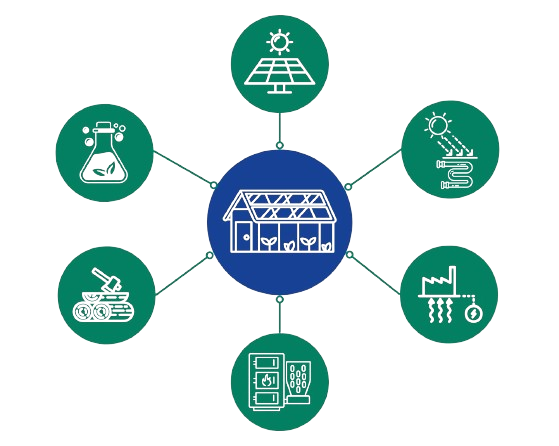North-West Europe has the highest density of heated greenhouses in Europe and fossil fuels are the main energy source. Energy is the second largest component of production costs, second to labor. RE-Greenhouse is a new Interreg North-West Europe-project that aims to accelerate the transition from fossil fuels to renewable energy in the greenhouse sector for climate resilience, food security, and enhanced competitiveness.
RE-Greenhouse brings together 11 partners from 5 NWE countries (BE, FR, DE, LU, NL), each expert in a particular field with pilot greenhouses using a specific renewable energy source. A high potential for use of renewable energy sources in the greenhouse sector is unexploited because expertise on promising renewable energy sources is locked behind borders and greenhouse holders often lack time, means and knowledge to make decisions. The RE-Greenhouse project partners want to collaboratively tackle this challenge by exchanging expertise and setting up various cross-border actions.
11 multidisciplinary and complementary partners committed to a common goal: speeding up the uptake of renewable energy sources in greenhouses.
Pilot set-ups of promosing renewable energy source technologies
The project will set up a transnational metrix plan and transfer system for greenhouse
operational data and implement this in six pilot sites with six renewable energy source technologies:
- Solar energy
- Heat network
- Residual heat
- Pellet heating system
- Wood heating system
- Biogas
The data retrieved from the pilot set-ups, together with information from stakeholder consultations and historical data will be used to develop an open decision tool for the flow, production, consumption and storage of renewable energy sources in greenhouses.
On-site demonstration visits to the pilots will be organized to inform, inspire and stimulate greenhouse holders and stakeholders to transition to renewable energy sources.
Focus on six promising renewable energy source technologies
Greenhouse energy shift: accelerate the transition to renewable energy

Energy decision tool for greenhouse holders
The new decision tool will be able to determine which renewable energy sources are possible and opportune for a specific greenhouse production. It will offer easy technical and economical options. The tool will be offered widely in Belgium, Germany, France, Luxemburg and The Netherlands through an international open call. On-site demonstration visits and targeted trainings will be organized to increase the adoption and uptake of the tool and thus supporting the greenhouse holders in the needed transition to renewable energy sources.
The ‘Greenhouse renewable energy source decision tool’ will be a gamechanger for every greenhouse operator in North-West Europe.
Towards sustainable, resilient and environmentally friendly practices
By transitioning to renewable energy sources, greenhouse holders will be able to avoid negative volatility caused by geopolitical events and market spikes. The long-term effect is a systemic change of a fossil dependent and energy consuming sector towards sustainable, resilient and environmentally friendly regional practices, which leads to food security, provide attractive career options and increased competitiveness in the global market for sustainable agricultural products. Increasing the resilience of an important sector in agriculture will also provide opportunities for further digitalization and integration into wider infrastructure developments.
About RE-Greenhouse
The RE-Greenhouse project, coordinated by Inagro and supported by a €2.3 million grant from the Interreg North-West Europe programme, aims to accelerate the transition from fossil fuels to renewable energy production in NWE greenhouses. The consortium includes 11 partners from Belgium, France, Luxembourg, and the Netherlands.